1930 - 1949 A Bright Dawn
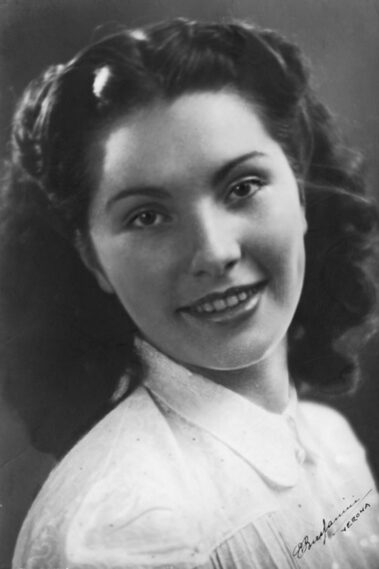
Early Days
Rosanna Carteri was born in Verona on the 14th of December 1930, the second daughter of Ugo Carteri and Giulia Rosoleni. She had an older sister, Marisa, with whom she was very close.
Her mother Giulia noticed Rosanna’s singing qualities very early on and had her take singing lessons from maestro Donati, husband of the soprano Maria Caniglia. By the age of twelve, Rosanna had already learned numerous operas by heart.
In 1942 came the decisive meeting with maestro Ferruccio Cusinati, considered at the time to be one of the greatest authorities in the field of Music. At first unsure, after hearing her, he exclaimed : « Well, we’ll make something out of this girl, she’s not like the others! ». With iron focus and avid study, Cusinati helped her to perfect her already naturally set voice, emphasising its technical precision and expressive phrasing.
The first concerts
In 1944, the war was not yet over and Rosanna was only 13 years old when she performed in her first public concert on the 1st of October, in Torri del Benaco (Verona).
In November 1945, she performed in two concerts in the company of the baritone Antenore Reali and the great Aureliano Pertile, who was deeply impressed by the young girl’s vocal and artistic qualities, publicly pronouncing: « Unfortunately, I am the sunset, but this young girl is the dawn ».
For a few years, she continued to study and sing in various concerts, until in June 1948 she won a national competition organised by the Italian Broadcaster RAI for « Voci Giovani » (Young Voices), marked the path for her operatic debut.
The debut at Caracalla
She made her debut as Elsa in Richard Wagner’s Lohengrin, on the 14th of July 1949, at the Terme di Caracalla in Rome. The performance was conducted by Maestro Santini. On this occasion, Rosanna understudied Renata Tebaldi; with only two days to prepare and no orchestra rehearsal, Rosanna’s stage presence and confidence showed through.
At the end of the performance, she said radiantly: « I’m sorry it’s over! »
Rosanna had great success with audiences and critics alike, and at the age of eighteen she was the revelation of the summer season at Caracalla.
From that evening onwards, the young woman from Verona established herself as soprano Rosanna Carteri and her radiant career took off. « Singers like Rosanna Carteri clear the ground: and their name, like a spotlight, shines on the velvets of the royal park ».

1950 - 1953 The Rise
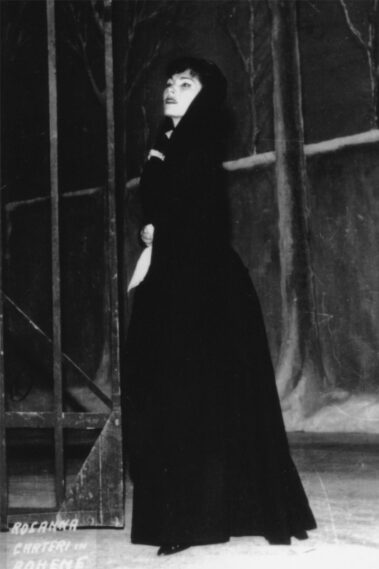
Constructing the repertoire
In the first four years of her career, she performed in twenty-seven roles, ranging from operatic to lyrical-dramatic roles in disparate styles, from baroque to verismo, not including her many performances of sacred music.
A series of debuts followed:
1950
Puccini’s Suor Angelica in the title role,
Verdi’s Falstaff in the roles of both Alice Ford and Nannetta,
Bizet’s Carmen in the role of Micaela,
Puccini’s Turandot in the role of Liù,
Gounod’s Faust in the role of Marguerite.
1951
Boito’s Mefistofele in the role of Margherita,
Gluck’s Orfeo ed Euridice in the role of Euridice,
Coehlo’s Ines de Castro in the role of Ama,
Rossini’s Mosè in the role of Sinaide,
Puccini’s Bohème in the role of Mimì, her favorite.
1952
Mozart’s Don Giovanni in the role of Zerlina,
Respighi’s Belfagor in the role of Candida,
Verdi’s Otello in the role of Desdemona,
Rossini’s William Tell in the role of Matilde,
Massenet’s Manon in the title role.
1953
Pedrollo’s Crime and Punishment in the role of Sonja,
Mascagni’s L’Amico Fritz in the role of Suzel,
Verdi’s La Traviata in the particularly beloved role of Violetta,
Tchaikovski’s Eugenio Oniegin in the role of Tatiana,
Verdi’s Rigoletto in the role of Gilda.
She sang in prestigious Italian theatres such as the Teatro dell’Opera in Rome, the Fenice in Venice, the San Carlo in Naples, the Teatro Comunale in Florence, the Conservatorio Verdi in Turin, the Comunale in Bologna, the Teatro Verdi in Trieste, the Teatro Municipale in Reggio, the Teatro Sociale in Mantua, the Carlo Felice in Genoa, the Teatro Rinnovati in Siena, the Teatro Massimo in Palermo and the Teatro Bellini in Catania.
She began to travel abroad, performing at the Teatro Victoria Eugenia in San Sebastian, the Teatro San Carlos in Lisbon, the Grand Théâtre in Bordeaux, the Palais des Fêtes in Strasbourg, the Théâtre des Champs Elysées in Paris, the Stadttheater in Zurich and the Festspielhaus in Salzburg for the Music Festival.
She worked with famous colleagues such as Caniglia, Capecchi, Corelli, Di Stefano, Gobbi, Panerai, Prandelli, Rossi Lemeni, Stabile, Simionato, Taddei, Tagliavini, Truccato Pace, Valletti, Warren and with important conductors such as Maestros De Fabritiis, De Sabata, Gavazzeni, Molinari Pradelli, Previtali, Quadri, Rossi, Sanzogno, Serafin, Votto.
The debut at La Scala
In February 1951 she made her debut at the Teatro alla Scala di Milano in the role of Cecchina in Piccinni’s Cecchina ossia la Buona Figliola. Rosanna was only twenty years old when she reached this great childhood dream of getting to sing at La Scala. This event would mark the beginning of a collaboration with this theater throughout her career, taking part in 19 productions as well as two more at the Piccola Scala.
Another notable event around this time, was her meeting with the great Beniamino Gigli, in two « Martini and Rossi Concerts » in January 1951 and February 1953. She would later recount : « Next to that giant of opera, that singing master, an idol for international audiences, I felt really small. I could barely look him in the eye. The emotion I felt when I shook his hand at our first meeting was indescribable. He greeted me with a big smile. »
First performances
In May 1950, at the Teatro Comunale in Florence, she sang in the first stage performance of Ildebrando Pizzetti’s Ifigenia, conducted by the composer.
In March 1952, she sang in the world premieres of two operas:
Catozzo’s I Misteri Gloriosi at La Fenice in the role of Maria,
Castro’s Proserpina e lo Straniero at La Scala in the role of Flavia.
In the Maggio Fiorentino in 1953 she played Natasha in the first performance in Italian language of Prokofiev’s War and Peace, based on the Tolstoy novel.
A critic wrote: « An exceptional interpretation that highlighted the infinite possibilities of Carteri who, through a refined education and an intensive and constant study, possesses a vast and particularly refined repertoire ».

1954 - 1957 Global Consecration
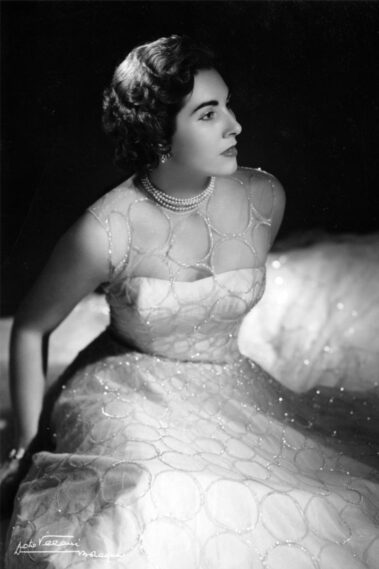
New roles in Italy and abroad
Rosanna demonstrated a versatility and musical adaptability to interpret traditional and modern operas alike, as she was able to deeply understand and integrate characters, enriching them with her own personality.
In 1954 she made six debuts:
Bellini’s Capuleti e Montecchi, in February at the Teatro Massimo in Palermo, in the role of Juliet with Giulietta Simionato as Romeo.
In March, travelling to Lisbon, she sang three new roles:
Menotti’s La Medium as Monica, Orff’s Carmina Burana and Mozart’s Nozze di Figaro as Susanna.
After the performance, King Umberto II di Savoia, exiled in Cascais, and his daughter Maria Pia met the troupe.
At the Teatro alla Scala, she sang:
Wolf Ferrari’s Quatro Rusteghi in June in the role of Lucieta and Donizetti’s L’Elisir d’Amore in December in the role of Adina.
In 1955 she made another debut at La Scala in the role of Parascia in Mussorgskij’s La Fiera dei Sorocinzi, an opera whose first performance took place in Monte-Carlo in 1923.
In 1957 she made four debuts.
In January she performed two operas by Donizetti: Don Pasquale in the role of Norina at the Teatro San Carlo in Naples and Linda di Chamounix at the Teatro Massimo in Palermo; followed by Gluck’s Orfeo ed Euridice, also in Palermo.
At the end of March, she starred in the world premiere of Mannino’s Vivì conducted by Maestro Serafin at the San Carlo Theatre in Naples. This avant-garde jazz opera in Sicilian dialect, with samba and experimental vocals, caused a great stir especially for the stage costumes, including a beautiful silk pyjama.
During this period, she went on tours in Italy and abroad.
In Italy, in May 1954, she sang Otello at the Nuovo in Turin with Mario del Monaco, marking the beginning of an important artistic union between the two singers.
Three operas at La Scala: in January 1955, a Carmen conducted by Maestro Von Karajan; in April, a Bohème conducted by Maestro Bernstein; in February 1956, to commemorate the second centenary of Mozart’s birth, a Don Giovanni conducted by Maestro Ackermann.
Abroad, she sang Manon and Elisir d’Amore in 1955 in Bilbao. In 1956 in Wiesbaden she performed in Bohème. In 1957 she sang Elisir d’Amore and Bohème in Madrid, Bilbao and Oviedo.
With the Teatro alla Scala’s crew conducted by Maestro Sanzogno, she sang L’Elisir d’Amore in 1956 in Johannesburg and in 1957 in Edinburgh at the King’s Theater.
United States of America
At the end of August 1954, Rosanna embarked with her mother on the steamer Andrea Doria bound for the United States. Arriving in New York, they took the train to San Francisco where they arrived in mid-September. Rosanna sang La Bohème, Manon, Le Nozze di Figaro and in a new role as Donna Gabriela in Cherubini’s Osteria Portoghese. The program was performed once more in Los Angeles, Pasadena and Chicago and the American tour ended in New York where she participated in the Ed Sullivan Show on prime time television, with the famous Bohème song “Sì. Mi chiamano Mimì”. With resounding success from the public and critics, she was defined as the « Queen of the Scene »; in San Francisco, her Mimì elicited 15 minutes of applause for her interpretation of a ‘yarn on high A’ (filato su La acuto).
In September 1955, she flew back to the United States, where she stayed until the end of November. She sang Don Giovanni, Carmen, Faust, La Bohème and L’Elisir d’Amore in San Francisco, Los Angeles, Fresno, Philadelphia and Chicago.
Once again, the press and the public praised her voice, her artistic personality, her acting talent, her elegance and her charm.
Before leaving, Paramount offered her a contract for a series of musical comedies on the condition that she would give up her career for seven years, but Rosanna turned it down for her love of the Opera.
Television
Television had just appeared in the homes of Italians and Rosanna was among the first Italian opera singers to understand its potential for bringing opera to the general public.
At the end of 1954, she played Violetta in the televised Traviata with Filicudi and Tagliabue directed by maestro Sanzogno. It was her first contact with the cameras and the noisy television studios, drastically different from the familiar quiet of the recording studios.
Her television appearance was viewed by eight million people ; the close-ups created an intimacy with the character that was impossible in live performances, and her notoriety skyrocketed.
She also received a numerous letters and marriage proposals, thus becoming « the Italians’ fiancée »!
After the success of La Traviata, in June 1955, she was invited once more to the RAI studios to record Massenet’s Manon, and ratings boomed once again.
In 1956, she reappeared on television in the role of Susanna in Le Nozze di Figaro and in the role of Elvira in Il Convitato di Pietra by Gazzaniga.
In the same year, she took part in the film « Mi permette Babbo » with Alberto Sordi and Aldo Fabrizi, where Sordi played the part of the doctor in the final scene of Traviata.

1958 - 1960 At the Pinnacle of Success
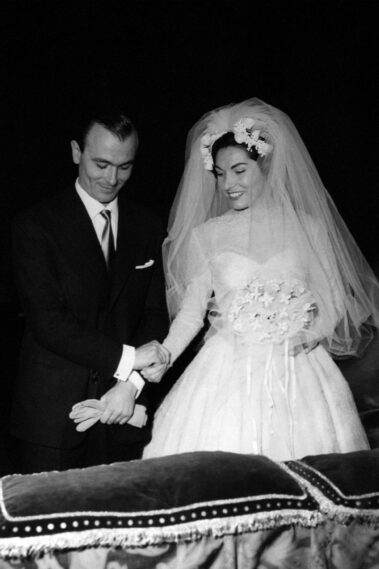
More Debuts and Premieres
To mark and celebrate the centenary of Puccini’s birth in 1958, Rosanna played Magda in La Rondine in January at the San Carlo in Naples; there are no recordings of the opera but a well-preserved video clip remains.
In the same year, she inaugurated the Maggio Fiorentino at the Teatro la Pergola singing Elena in Rossini’s Donna del Lago conducted by Maestro Serafin, an opera that had not appeared in theatres for more than a hundred years. Prime Minister Zoli and numerous city authorities were present and at the end of the performance, she was congratulated by her colleague Renata Tebaldi and the actor Alberto Sordi.
At the end of September, a new recording for RAI of Verdi’s Otello with Mario del Monaco conducted by Maestro Serafin: her « Ave Maria » moved the audience.
In November, she sang at the premiere of L’Elisir d’Amore at the Teatro dell’Opera in Rome in honour of the Shah of Persia’s visit to Italy.
In December, she opened the opera season at La Scala in Milan with Turandot, performed with Nilsson, Di Stefano and Corelli and conducted by Maestro Votto.
In 1959, she made her debut at the San Carlo in Naples in Poulenc’s Dialoghi delle Carmelitane, the composer affirmed that Rosanna represented for him « the Bianca of his Dreams ». The same opera was later performed in Catania in the presence of the Bishop.
In June, she made another debut at the Teatro della Pergola in Florence as Angelica in Handel’s Orlando. « Although in the part of a dramatic soprano of agility, she disengaged herself with bravura, drawing her character with lordly elegance ».
In mid-March 1960, she left for London where she conquered the hearts of the English public with four performances of Bohème at the Royal Opera House in Covent Garden. The premiere was in the presence of the Queen Mother, and Rosanna met Her Royal Majesty at the end of the performance. For the occasion, she modified the finale of « Donde lieta uscì» by inserting a « D flat pianissimo », an effect described as a « silky sigh ».
The Arena of Verona
Ever since she was a child, Rosanna attended performances at the Arena in Verona, where she witnessed come to life the fairy tale characters from the stories her mother had told her as a child.
Finally, in July 1958, it was with great emotion that she sang for the first time in her hometown at the Arena in the role of Liù in five performances of Turandot conducted by Maestro Votto with Yeend, Corelli and Vinco. To remember Puccini at the moment of Liù’s death, the music stopped and the standing audience gathered in a minute of silence and then applauded shouting « Viva Puccini ».
In August 1959, she made her second and last appearance at the Arena, with six performances of Faust in the role of Margherita with Poggi and Cossotto, under the direction of Maestro De Fabritiis.
The Wedding
At the end of September 1959, she stopped all her artistic commitments because on the 10th of October, Rosanna realised her dream of starting a family, and married industrialist Franco Grosoli in the Basilica of San Zeno in Verona, packed with a crowd of loved ones and fans.
After the ceremony, a banquet was offered to the 400 or so guests at the hotel Due Torri; the newlyweds then left for their honeymoon on the Côte d’Azur : first stop in Monte-Carlo.
Rosanna moved from Verona to Padua to join her husband and build their matrimonial home.
On the 25th November 1960, their first daughter Marina was born and Rosanna happily sang her first Lullaby.

1961 – 1964 The Opera Lady
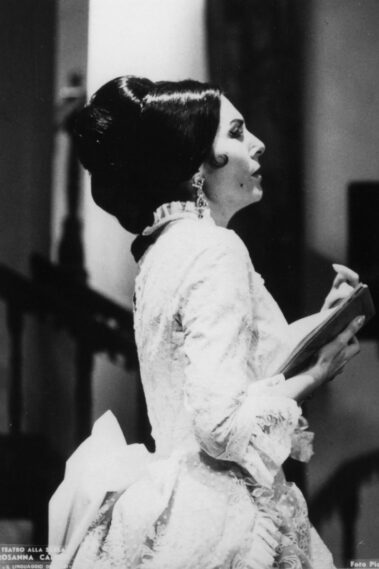
New roles, new colleagues
In 1961, she again made three debuts.
The first, in March, at La Scala she had the role of Metarosa in Pizzetti’s new opera, the Calzare d’Argento in its world premiere, with Di Stefano conducted by Maestro Gavazzeni. She received a photograph by Pizzetti with the following dedication: « To Rosanna Carteri, very sweet moving Metarosa in the first performance of Il Calzare d’Argento at La Scala on 23.3.1961. Grateful and thankful Ildebrando Pizzetti ».
The second one, in April, in Padua where she sang Puccini’s Tosca for the first time; the two performances in Padua and the one in November in Paris would be the only ones of her career.
She sang the third one as Porzia in Castelnuovo Tedesco’s Il Mercante di Venezia at the Maggio Musicale Fiorentino. The opera won the « Campari Prize » in 1958 and was a much-awaited premiere by Italian and foreign critics.
In early May, she sang Verdi’s Falstaff at the Teatro dell’Opera in Rome, the premiere in the presence of Italian President Ronchi and HM Queen Elisabeth, who was on an official trip to Italy with her husband Prince Philip of Edinburgh.
In 1962, she recorded four recital concerts for the RAI.
In February 1963, her last time at La Scala, for the premiere of Renzo Rossellini’s Il Linguaggio dei Fiori, based on Garcia Lorca’s homonymous poem. Critics praised her ability to translate poetic prose into sound and described her as « moved, moving and perfect Rosita ».
On the 19th of November of the same year, she performed as Rosita at the Monegasque National Public holiday in the presence of Prince Rainier and Princess Grace.
And in 1964 she recorded the same opera for the RAI.
She met a young tenor who was just starting his career, Luciano Pavarotti, and they sang together La Bohème in Lucca in 1961, in Reggio Emilia and Modena in 1962, in Cremona in 1963 and in Naples in 1964.
They also did two performances of Traviata together in Cagliari in 1963.
Conquering France
1961 began with two concerts in France.
In February at the Théâtre des Champs Elysées in Paris she performed the European premiere of Poulenc’s Gloria conducted by Maestro Prêtre. In June, she sang at the Strasbourg Festival at the Palais des Fêtes where critics wrote: « At times it was a lesson in singing. Rosanna Carteri showed us how she took the sound, filled it with light and warmth, when it reached its peak she took it back, spun it into a murmur close to silence. The artist unleashed delirious enthusiasm, she was hailed and acclaimed time and again. »
In August, she sang La Traviata twice: once in Vichy and once at the Paris Opera, followed by Tosca.
Rosanna presented herself in Paris with her simplicity, grace and kindness, and Paris reserved for her a superlative triumph. France Soir wrote: « Rosanna Carteri est la nouvelle vague du Bel Canto ». In La Traviata at the Opéra she received triumphant ovations with no fewer than twelve calls.
1962 continued with another series of concerts: in May in Versailles and Aix les Bains, where she also gave a performance of Traviata, in August in Deauville and in September in Besançon.
Again an enormous success, her stellar vocal technique was praised, as was her interpretation « with a breath of humanity and richness of feeling ».
She recorded Poulenc’s Gloria in August in Paris.
In September, she returned to Paris, this time with her husband and daughter, for another debut: she played Maureen in the premiere of the Opéra d’Aran by Gilbert Bécaud, a singer and songwriter very popular in France, who was trying his hand at composing an opera for the first time. The opera, directed by Maestro Prêtre, was announced and advertised in the major French and European newspapers: Marlène Dietrich, Juliette Greco, Françoise Sagan, Dalida, Roger Vadim, Catherine Deneuve and Begum attended the premiere. France Soir wrote « Rosanna Carteri is one of today’s most beautiful voices and has an innate sense of theatre ».
She was in Paris until the end of October for the Opera recording.
In 1963, she sang a Bohème in Nice in January, and in February a Verdi’s Requiem Mass conducted by Maestro Prêtre at the Théâtre des Champs Elysées in Paris.
In September 1964 at the Wagram recording studio in Paris, she sang her last debut in the new role of Juliette in Gounod’s Romeo et Juliette, joined by Gedda in the part of Romeo and conducted by Maestro Lombard.

1965 - 1974 The Last Notes
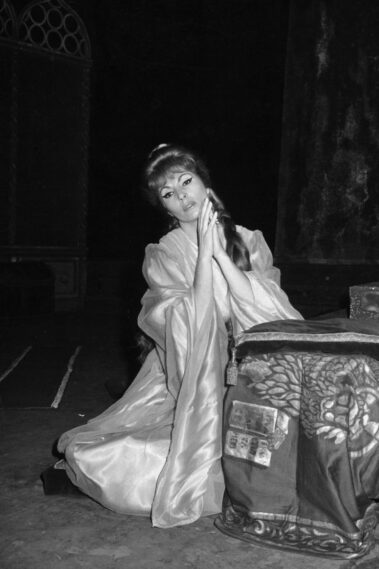
Violetta, Mimì and Desdemona
In 1965 she sang in numerous Bohème and Traviata: Mimì and Violetta were her two favourite roles, performed 90 and 45 times respectively.
She sang Bohème in Viareggio, Cremona, Rimini, Lugano. Critics wrote about her: « The female protagonist was Rosanna Carteri, one of those lucky creatures to whom nature has given, even before vocal chords, an innate sense of theatre ».
She sang Traviata in Nice, in Bilbao, and then returned to Padua.
The last Traviata in Paris conducted by Maestro Prêtre was almost a commemorative event: during « Addio del passato » she replaced the traditional pianissimo with a heartbreaking « mezza voce », symbolically broken by an inaudible breath.
In January 1966, she sang three performances of Otello at the Teatro Regio in Parma with wonderful reviews and success with the public; the role of Desdemona was also a role dear to her heart, which she performed 30 times.
And then she suddenly decided to leave opera because she was expecting a baby:
their second child, Francesco was born on the 4th of October 1966.
The curtain falls
Rosanna reappeared on television screens in 1969 by taking part in Lelio Lutazzi’s TV program « Ieri ed Oggi » , which showed extracts from Mario Riva’s « Musichiere » of 1960.
In 1971, after almost six years of hiatus, she made a brief appearance in a concert at the Teatro Regio in Parma, followed by Rossini’s Stabat Mater in the Chiesa degli Eremitani in Padua with Lucia Valentini Terrani conducted by Maestro Bertola.
The « joyful return of Rosanna Carteri » as it was dubbed.
In October she reappeared in three performances of Traviata at the Teatro Sociale in Rovigo.
In November, she sang in a concert for Unicef in Turin accompanied by Iris Adami Corradetti.
In 1972, after a concert in Padua, she sang in Pisa in Rossini’s Petite Messe Solennelle with Lucia Valentini Terrani conducted by Maestro Bertola.
In 1974 her last concert in Padua for the inauguration of the organ in the church of Santa Giustina was attended by the Bishop of Padua Mons.Bortignon and Cardinal Albino Luciani, Patriarch of Venice, who was to become Pope John Paul I in 1978.
A Decisive Choice
Rosanna Carteri embodied the parable of a soprano who combined technical perfection with an extraordinary theatrical instinct, leaving an indelible mark on the Italian Opera scene.
Her career was short but extraordinarily intense, singing in more than 500 operas and concerts.
Her particularly extensive repertoire allowed her to perform 51 roles and a dozen performances of sacred music.
After the birth of her second child, she said: « I always thought that you could not do everything in life: be a great artist and a good mother ».
At only 36 years of age, at the peak of her success, she then made a courageous choice by giving up Singing, her First Love, to devote herself exclusively to a Greater Love, that of her Family.
In 1975, she moved with her husband and children to the Principality of Monaco, where she lived for the rest of her life.
On the 10th of October 2009, she celebrated 50 years of marriage surrounded by the affection of her loved ones.
« She was a wonderful wife, mother and grandmother! »
Rosanna passed away on the 25th of October 2020, silently leaving the stage of life like her heroines, on « World Opera Day. »
However, the purity of her Voice will live forever in the hearts of all those who heard it.
« It was a dawn that chose to set early, leaving its light intact. »
